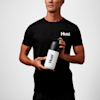Your Cart
Oops! Your cart is empty
2
We ask a record-breaking ultrarunner and a sports nutritionist to break down exactly how you should fuel yourself for a marathon.
When it comes to marathon training you have to put in the hard yards. But getting those big runs in isn’t everything. How you’re fuelling yourself ahead of, during, and even after those training runs and the race itself, can have a significant impact too.
Often nutrition can be forgotten about by casual runners. And we understand that talking about carb loading isn’t as thrilling as browsing new running shoes. But take it from the experts: it pays to know what you’re doing with your marathon nutrition. Those new Alphaflys aren’t going to fly when you’ve had a fry up for breakfast and now you’ve got a stitch after your first mile.
To help you find the marathon nutrition plan that works for you, we
asked some experts how to fuel before, during, and after a marathon.
First up, is Huel ambassador and ultrarunner, Will Goodge. Will is one of the fastest people to ever run across America – a 3,175-mile trek that took 55 days to complete – and has also run 48 marathons in 30 days.
Our other expert is Rebecca Williams, senior nutrition manager at Huel and a registered nutritionist with a specialism in sports nutrition. Together our expert team runs down the nutritional routine they’d recommend ahead of any upcoming marathons you have planned.
WG: “The work pre-marathon for me is done in the 48 hours before. Increasing complex carbohydrates, [and] trying to steer clear of too much dairy and fried foods. Keeping it clean and eating more than usual. Couple this with keeping on top of hydration and reducing caffeine. I want [the caffeine] to work better [for me] in the race.
The night before the race I’ll be sure to take a magnesium supplement., I do most nights, [as] it’s key to me getting good sleep. Upon waking, as I said I’ve done most of the hard work. I don’t like to eat lots and start feeling sluggish. For me, it’s simple: a couple of electrolyte sachets as I usually would, a banana, and a bowl of cereal with plant milk. Perhaps a pastry too with jam or honey, and a coffee.
I will [also] drink a high-carb drink up until the race begins.”
RW: “Carbs are king for your brekkie 3-4 hours before the race to top up liver glycogen levels. Ideally have a carbohydrate-rich meal, with little protein, fibre, or fat because these factors have been linked with gastrointestinal issues. Something like porridge with skimmed milk, or bagels and jam.
You might also want to top up in the 90 minutes before the start with some high GI snacks like jelly babies, a ripe banana, or a carbohydrate drink.”
WG: “Once in action I consume a gel every 25ish minutes. It’s essential these have salts in them too to avoid cramping. Otherwise, I’ll take salt tablets. All those electrolytes the morning of and the day before should assist nicely.
On the way around I am unlikely to eat any solid food, just gels, maybe some sweets if I can get my hands on some. I leave the caffeinated gels for the second half of the race as I want to feel that natural lift it brings.”
RW: “This depends on what you can stomach and what you have practiced with in training runs. It’s crucial to start [practicing running with food] 6-10 weeks before the race to train your gut if you're not used to it.
Ideally aim for 60g carbs per hour. Most opt for gels (these will usually deliver between 20-25g of carbs), chews, sports drinks, bars, and, of course, water. You also need to consider what you can carry. And try to use your own rather than trying something new during the race.”
WG: “Post-race it’s important to get the depleted vitamins and minerals back in, so a Huel Ready-to-drink is a perfect choice alongside more electrolytes. Once that’s done honestly I like to let loose and enjoy feeling like I can eat anything. The work is over. Celebrate and enjoy the achievement.” RW: “You'll be carb-depleted and most likely will have some degree of muscular strain or microdamage after completing a marathon so you need a meal prioritising carbs and protein. Also, rehydrate and replenish the fluid you've expended.”
Words: Richard Jones
Get 15% off your first order of $50, plus insider access to expert tips, exclusive discounts, and the latest from Huel.
This site is protected by reCAPTCHA and the Google Privacy Policy and Terms of Service apply. You can unsubscribe at any time. Huel Privacy Policy.
